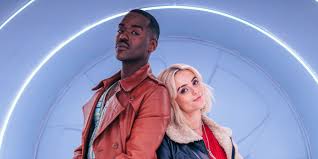Doctor Who Review 2024 Tv Show Series Cast Crew Online
Christmas specials don’t count. Intermediate trilogies where David Tennant is the Fourteenth-and-a-Half Doctor or whatever don’t count. The new era of Doctor Who, with Russell T Davies back as the showrunner and Ncuti Gatwa as the Doctor, only really begins here, with the new season proper. The first double bill, comprising Space Babies and The Devil’s Chord, points to a stellar future for Who as a youthfully chaotic playground of the imagination, far more fancy of foot and light of outlook than it has been for years. It only takes baby steps, for now, towards that new destination, but we can see it.
Gatwa establishes himself as a cracking Doctor immediately. What an obviously perfect piece of casting he is: commandingly hench in his colourful costumes, and naturally able to express the dazzling extremes the Doctor has to embody. He glowers, and the end of the world descends; a nanosecond later, he grins and we’re having the most fun in the universe. He’s delightful, but he’s also consciously more delighted than some of his predecessors, skipping and dancing and, on a few occasions here, doing a sideways gallop when he enters a room, like Kramer from Seinfeld with springs on his heels.
Davies, meanwhile, has always been a writer who deals in big ideas more than precise dialogue or watertight plotting, capable of those latter things though he is. Flushed with the many, many extra dollars that come from Who’s global tie-in with Disney – British viewers have to stay up until midnight to join in with the global premiere of this year’s episodes, timed as they are to suit US households – Davies looks unlikely to blow the cash just on shinier lasers, bigger spaceships and scarier monsters. The Devil’s Chord spends its budget, for example, on a wonderfully unnecessary and unexpected musical sequence, its scores of dancers telling the world that this show has a green light to do whatever it wants, and what it wants to do will be hard to predict.
Conventionally, an episode to open a much-anticipated new season will be tightly honed, but Space Babies bulges loosely, despite going to absurd lengths to accommodate new fans. The first 10 minutes is almost entirely given over to Gatwa standing at the controls of the Tardis, explaining to his boggling companion Ruby (Millie Gibson) why he’s called the Doctor, what happened to his home planet of Gallifrey, what Tardis stands for, why the outside looks like an old-fashioned police box, and so on and so on. Davies undercuts all this smartly with a throwaway trip to the distant past that enjoys making it clear that Doctor Who’s approach to the logic of time travel might be a little cavalier – but when the Doctor and Ruby have arrived at their first port of call, an apparently abandoned spaceship, and he’s still wanging on about the Tardis’s automatic translation software, one wonders whether all this housekeeping could have been woven more efficiently into the action across several stories.
In the time left, Space Babies is a textbook example of a mid-ranking Who instalment, fun but forgettable and, ultimately, not making sense. Try summarising what follows on from the arresting initial revelation that the spaceship is being piloted by a gang of babies in strollers, and you will falter. Within such a half-formed narrative, Davies’s usually stirring efforts to dot his script with political and personal messages are awkward. He just about gets away with a rousing speech from the Doctor about learning to embrace being unorthodox, but an allegory about the rollback of abortion rights in the US is accompanied by the deafening scrape of a crowbar. Gatwa and Gibson need to muster all their open-hearted energy – which is, in the best possible way, childish – to see the story through.
Much better is episode two, The Devil’s Chord, which takes the Doctor and Ruby to Abbey Road to witness the Beatles recording their debut album. “Amazing!” says the Doctor, when Ruby makes this suggestion, and as the pair arrive in London in full Austin Powers outfits, he does a cheesy cockerney accent to further suggest this will be a gaudy, Carnaby Street romp.
This, however, is an altered 1960s where the Beatles are churning out soulless pap – Gatwa’s disgusted/astonished face is hilarious – thanks to the villainous Maestro (Jinkx Monsoon) having stolen humanity’s ability to find succour in musical expression. If the narrative’s ultimate message is sentimental, amounting as it does to Davies saying, “I love music, me! It’s brilliaaaaant!”, Monsoon’s wicked-witch flamboyance gives it a menacing edge. Then that song-and-dance number arrives, joyous and ostentatiously random: if the comeback season can find stories to match its creator’s flair and its leading man’s star power, new dimensions await.




